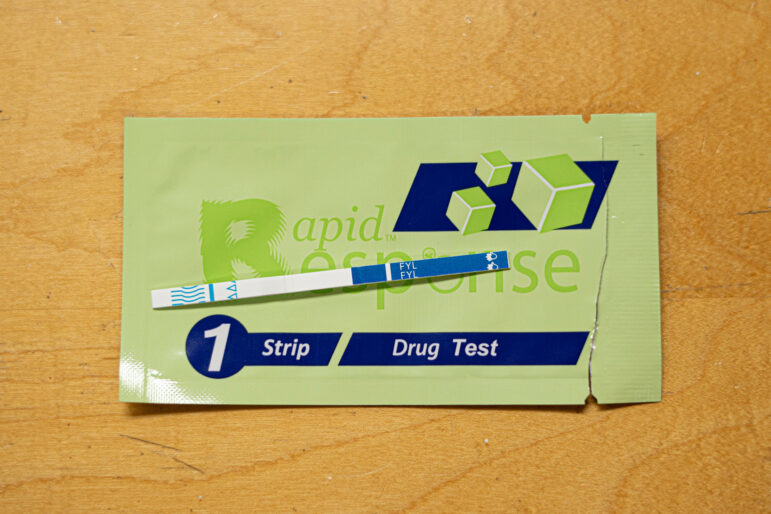“Aug. 31 is International Overdose Awareness Day. Here in New York City, the overdose crisis has reached historic levels: 2,668 people died of drug overdoses in 2021, a 78 percent increase since 2019. As someone who recently survived an overdose, this crisis hits incredibly close to home.”

NYC Council
A fentanyl testing stripAug. 31 is International Overdose Awareness Day. Here in New York City, the overdose crisis has reached historic levels: 2,668 people died of drug overdoses in 2021, a 78 percent increase since 2019. As someone who recently survived an overdose, this crisis hits incredibly close to home.
My personal experience—as well as my professional role as an outreach coordinator at Alliance for Positive Change’s LES Harm Reduction Center—has taught me that increasing harm reduction awareness, access, and resources are crucial to turning the tide on our current crisis.
The unexpected presence of fentanyl and xylazine in the unregulated drug supply is a factor that is driving the growing number of deaths. Both can be found in everything from cocaine to counterfeit pills, and for those without a tolerance, it can be extremely dangerous.
As an outreach worker, I share information and resources with the community that can save lives. Fentanyl and xylazine test strips are key harm reduction tools that I distribute in the field. People can use the strips to test their drugs and make a more informed decision about how they use their substances.
Syringe Service Programs are another crucial component of harm reduction. These initiatives not only help prevent the spread of infections, but also establish points of contact where individuals can begin to build trust with a community provider and access resources, counseling, and referral services. By meeting people where they are, syringe exchange programs break down barriers to seeking support, no matter what that looks like for the individual.
My own overdose came while grocery shopping. I had taken a pill that I didn’t know contained fentanyl. I didn’t have fentanyl test strips to use. When I fell over, an emergency responder gave me Narcan, and it saved my life. We need more New Yorkers to have access to and knowledge of how to administer this overdose reversal drug. Community-based harm reduction organizations like Alliance for Positive Change are critical to distributing resources like Narcan in communities most impacted by the overdose crisis.
My journey from overdose survivor to harm reduction advocate has taught me that compassion and understanding are infinitely more powerful than judgment and isolation. As an outreach coordinator, I know that the harm reduction tools themselves—like testing strips, Syringe Service Programs, and Narcan—are extremely valuable. But the community, connection, and compassion our team offers are often even more important. Amid an unprecedented crisis, New York must invest in harm reduction measures as a means of saving lives.
This Overdose Awareness Day, my own experience serves as a stark reminder that behind every statistic is a person who deserves a fighting chance. I am proud to no longer use drugs, but everyone’s journey is different—there is no one-size-fits-all solution. Together, let us champion a future where harm reduction takes precedence, and every individual has the opportunity to continue to write their own story. Only then will we start to turn the tide on the overdose crisis.
Ashley Lynch is an outreach coordinator at Alliance for Positive Change.
To reach the editor behind this story or to submit your own opinion piece, email Jeanmarie@citylimits.org.








